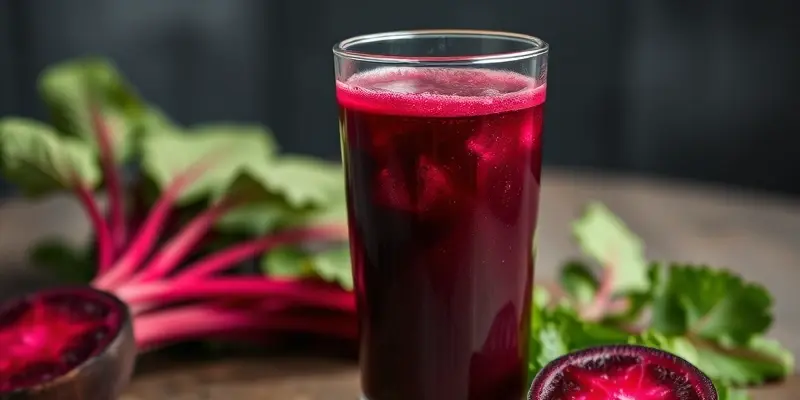By the GymPulse Club Team, led by a certified fitness and sports nutrition expert
Why Recovery and Injury Prevention Matter
Whether you’re a weekend runner, dedicated gym enthusiast, or training for your next big game, one truth is universal: you can’t make progress if you’re sidelined by fatigue or injury. Consistent training, swift recovery, and reduced injury risk are the cornerstones of long-term fitness success. But is there a nutrition hack that can help with all three? Science says: yes—beet juice!
The Science Behind Beet Juice
Let’s keep it simple. Beet juice is packed with natural compounds called nitrates. When you drink it, your body converts these nitrates into nitric oxide. Nitric oxide acts like a supercharger for your bloodstream—it dilates blood vessels, improves circulation, and helps muscles receive more oxygen and nutrients during workouts.
Think of it as giving your body’s “delivery trucks” (blood vessels) the green light—making their routes faster and easier, right when your muscles need it most.
Endurance Gains: How Beet Juice Helps You Go Farther
Curious about why many endurance athletes swear by beet juice? Let’s break down the proven benefits:
- Increases Time to Exhaustion: Multiple studies show beet juice lets you exercise longer before fatigue sets in. It’s like getting an extra battery pack for your muscles.
- Enhances Oxygen Efficiency: Your muscles become more efficient at extracting and using oxygen. Imagine running at your usual pace, but it feels noticeably easier.
- Reduces Perceived Exertion: Many users report tough workouts feel less taxing after beet juice. Think of it as “WD-40” for your cardiovascular system!
Whether you’re cycling, running, or participating in HIIT, adding beet juice to your routine can help you push your limits—especially if you’re newer to endurance training.
Faster Recovery and Less Muscle Soreness
Training hard means dealing with muscle soreness, stiffness, and sometimes, that dreaded “next day” fatigue. Here’s where beet juice steps up:
- Rich in Antioxidants: Beets contain unique antioxidants like betalains and polyphenols, which help reduce inflammation and repair muscle damage after intense exercise. These antioxidants play a crucial role in antioxidants in sports nutrition for injury prevention and recovery.
- Speeds Up Recovery: Enhanced nutrient delivery and reduced inflammation mean less muscle soreness and a faster bounce-back between sessions.
Practical example: After a tough leg day or a long run, drinking beet juice can help you feel mobile and pain-free sooner, so you can stick to your training plan.
Injury Prevention and Return-to-Play
Let’s talk injury—no one likes bench time! Beet juice may help lower your risk of overuse injuries and speed your return if you do get hurt:
- Boosted Blood Flow: Improves oxygen delivery, which tissues need to heal.
- Muscle Efficiency: Makes muscles work better, reducing strain and risk of pulls or tears.
- Anti-Inflammatory Power: By controlling inflammation, beet juice may help prevent nagging injuries that come from repetitive use.
Real-world scenario: Say you’re ramping up training for a marathon or trying to return from a mild ankle sprain. Implementing beet juice alongside your rehab and warm-up routines could help you recover faster, and get back to peak performance with less risk. For additional support during recovery, check out our injury recovery checklist.
How to Use Beet Juice Safely and Effectively
Maximize beet juice’s power by following evidence-based strategies:
- Dosage: Most studies recommend about 8.5 ounces (250 ml) daily, ideally starting a few days before a big event or continuing through your training cycles.
- Timing: Effects kick in within a few hours, but steady use over several days yields the best results, especially for endurance.
- Who benefits most? Beginners and recreational athletes get the largest boost, but even elites may notice subtle endurance or recovery improvements.
- Side Effects: Some people experience mild stomach upset or notice pink urine (totally harmless!). Test your tolerance before race day.
Conclusion: Should You Add Beet Juice to Your Recovery Toolbox?
To sum up, beet juice isn’t just a fitness fad—it’s a well-researched, natural way to boost endurance, recover faster, and possibly avoid injuries. For those chasing new goals or coming back from setbacks, it’s a simple (and tasty) addition to your routine.
Ready to give your workouts a boost? Try adding beet juice to your pre-exercise regimen and monitor how you feel. If you have specific health concerns, chat with a performance nutritionist for tailored advice.
At GymPulse, we always put your progress and well-being first—so you can train smart, recover well, and stay in the game!

